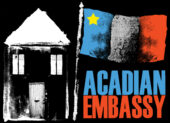Acadian powerpop quartet SLUICE presents a history lesson, a love letter to home, and a fist-pumping banger with their sophomore album, Archiviste. Listen and buy HERE.
A historical epic of ten high-gloss tracks crafted alongside renowned collaborators – recording engineer Thomas D’Arcy (The Sheepdogs, July Talk, NOBRO), mix engineer Jay Dufour (Ria Mae, Tokyo Police Club, Avril Lavigne), and producer AA Wallace (Sleepless Nights, Cheval) – Archiviste is the most fun you could possibly have learning about niche Nova Scotian Acadian history while soaking in your 1990s nostalgia—Gin Blossoms on speed (but make it nerdy).
Released during Nova Scotia Music Week in Yarmouth, NS and arriving ahead of a showcase at Coup de Coeur Francophone in Montreal, QC this Saturday, November 11, the opus encompasses a wide range of sonic influences for the group, lead by Trevor Murphy; from Weezer to Motörhead, from The Ramones to The Lemonheads, from Thin Lizzy to Jimmy Eat World – a combination which offers a unique spin on “Acadian music.”
With the support of the Canada Council for the Arts, Murphy—who, when speaking English, leads the indie-folk band Quiet Parade—made trips to his home county of Yarmouth to the Argyle Township Court House and Archives in Tusket, where he dug through hundreds of years of newspapers, manuscripts, property records, photos, and even his own elementary school projects. He took that information into a series of self-imposed writing residencies in the region, nudging facts next to feelings, then setting those to melodies. Nearly all 10 songs on the album were created this way.
“I wanted to take stock of Par-en-Bas, the place and the villages where we grew up. There’s this whole subset of Acadian culture that’s been there for 200 years minimum, sometimes way longer—pre-deportation—that we never even knew when we were growing up there,” says Murphy. “I found that so disheartening, that no one took the time to tell us what was special about that place. So of course you wanna leave. And I had to find my own way back to it.”
Though it sounds like the cult favourite record of a band that would have co-headlined a college tour with Nada Surf and Harvey Danger in the mid-90s, Archiviste presents the roots of the Acadian heritage Murphy held hints of but had to go looking for. The high-energy call-and-responder “La sorcière de la Pointe-du-Sault” is about a witch in the band’s namesake village, Sluice Point. “Madeleine“ tells the incredibly true story of a woman who escaped multiple deportation attempts in the 1750s, living many years alone in the woods of Pubnico before ending up married in France until she died in her 80s. The mid-tempo “L’année des trois huits” (the year of three eights, or 1888) details – according to the accounts in the French-language newspaper L’Évangeline – the worst year on record for farming and fishing in Wedgeport. The synth-laden pop-punk banger “Danse le carême” centers on a restaurant that had a Footloose-style no-dancing rule during Lent. “American Lights,“ the record’s only all-English song, tells the always-relatable story of a small-town writer who dreamed of making it big. And its companion, the jangly, layered “Paradis sur la côte,“ is an ode to the founding of Tusket, the hub village of the area, which is on the way to almost everywhere else you want to go.
Murphy’s own experience in this unique collection of villages is woven in amongst the historical references. On songs such as “Le ch’monne à Cyril (Black Pond Road),“ about a high-school era party and “Carino,“ in part a track about the men slightly older than him he’d see “waiting at the wharf to go fishing” for the rest of their lives, hyper-regional geography anchors the memories and provides the framework for high-octane guitar rippers that compress a curious blend of influences – what if Weezer covered Motörhead? On the lead single “Agis comme du monde,“ careful emphasis is placed on constructing the shouted call-and-response verse lyrics using words and sayings familiar to the distinct dialect of Par-en-Bas (ackmode, malonne, garoche, feutchaques) – itself a novel way of preserving the culture of one the oldest Acadian region in the world.
The closing track, “Brébis dans la brume” (sheep in the fog), is a somber piano-driven ballad, nudged forward by swirling cymbals and a distant kick drum, about how the waning popularity of the Catholic church has impacted these small communities, and continues to. Changing landscapes, youth exodus, and population shifts – “rural malaise,” as Murphy puts it.
Though it ends on a sobering note, Archiviste is at its heart a document of a resilient, proud, and exceptional part of the world whose history is largely unknown. It took a rock band to find the grace notes.
“I wanted to do this project for myself and for people to have a road map,” says Murphy. “These are some really fascinating stories about these places that you may have never heard before.”
Archiviste is available now via Acadian Embassy.
Shopping Cart


